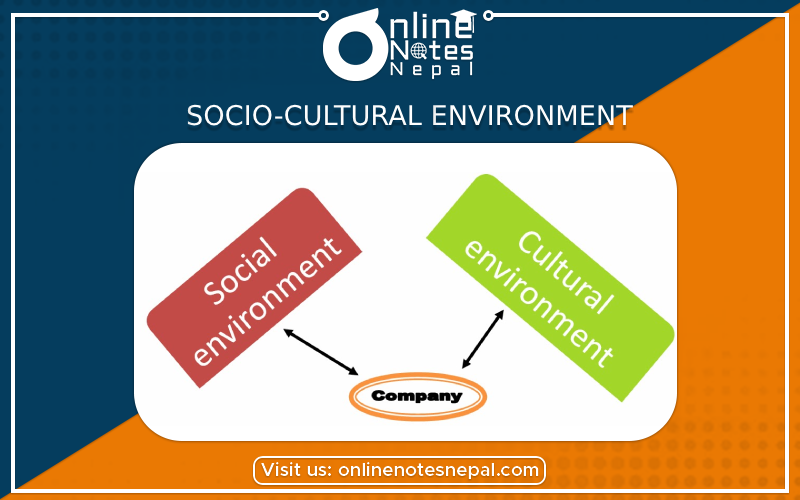Published by: Anu Poudeli
Published date: 20 Jul 2023

The socio-cultural environment refers to a society's or community's common values, beliefs, attitudes, practices, and behaviors. It shapes people's identities, influences their actions, and determines how they interact with one another and with the world around them. The following are some important characteristics of the sociocultural environment:
Cultural Values and Beliefs : Cultural values and beliefs are essential beliefs and principles that influence a society's conduct and create a feeling of identity and purpose. These values can include ideals such as liberty, equality, justice, respect for elders, and the value of family. Cultural beliefs include religious, philosophical, and traditional opinions that shape people's worldviews and decisions.
Social Norms : Social norms are unwritten rules that govern appropriate behavior in a specific culture. They can cover a wide range of topics, including communication methods, gender roles, clothing requirements, and acceptable manners. Adherence to social standards is frequently required for people to be accepted and respected in their community.
Language and Communication: Language is an important part of culture because it allows people to convey their thoughts, emotions, and beliefs. Different languages can result in a variety of worldviews and communication styles, influencing how individuals interpret and interact with their surroundings.
Traditions and customs: Customs and traditions are practices and rituals passed down through generations. Religious ceremonies, cultural festivals, marital rites, and other significant events that help reinforce a culture are examples of this.
Social Institutions : Social institutions are the structures and organizations that organize and manage different parts of society, including the family, education, government, religion, and the economy. These institutions play an important role in molding people's actions and connections in the community.
Education and Media: Educational systems and media sources are critical in conveying cultural values and information to future generations. They have an impact on people's perceptions, understanding of the world, and role in society.
Art and Entertainment: Art, literature, music, and other forms of entertainment both reflect and impact a society's cultural identity. They provide insights into a community's ideals, aspirations, and feelings.
Cultural Diversity: Sociocultural contexts can be diverse, including a wide range of ethnicities, languages, and belief systems. Tolerance, mutual understanding, and the potential for creativity and innovation are all enhanced by embracing cultural variety.Cultural Diversity: Sociocultural contexts can be diverse, including a wide range of ethnicities, languages, and belief systems. Tolerance, mutual understanding, and the potential for creativity and innovation are all enhanced by embracing cultural variety.
The Impact of Globalization: Globalization has promoted the exchange of ideas, values, and practices between cultures, resulting in cultural homogenization as well as enhanced awareness and appreciation for cultural diversity.
Socio-Cultural Change: Societies do not remain static; they change over time as a result of causes such as technological breakthroughs, migration, and social movements. Changes in the socio-cultural environment can have an impact on individuals and groups in both positive and bad ways.
Individuals, corporations, and policymakers must understand the socio-cultural context in order to navigate and engage effectively within society. Recognizing and valuing cultural differences can help to create more inclusive and peaceful communities by encouraging mutual respect and collaboration among varied groups.